glossary unit 4 diogenes and Alexander
10-Unit-4-Diogenes-and-Alexander-教案讲义

Unit 4一、授课时间:第8、9周二.授课类型:理论课9课时;实践课3课时三.授课题目:Diogenes and Alexander四.授课时数:12五.教学目的和要求:通过讲授课文使大学生了解有关犬儒哲学的有关知识,学会用英语解释句子以达到学以致用的目的。
要求学生主动地预习课文,课前准备练习,学会分析文章体裁和进行段落划分。
六.教学重点和难点:1)背景知识的传授:Diogenes and Cynicism (doggishness);2)文章的体裁分析及段落划分;3)语言点的理解:Word study: account; possess; form; roll; elaborateGrammar Focus: The function of adverbial modifier in different sentences; Patterns: the first/second, ect./the next/last+to-infinitive; the first, ect. + who/that clause七.教学基本内容和纲要Part One Warm – up1.1 Warm-up Questions1.2 Define the following words and phrasesPart Two Background Information2.1 Differences and similarities between Diogenes and AlexanderPart Three Text Appreciation3.1 Text Analysis3.1.1 Theme of the text3.1.2 Structure of the text3.2 Writing Devices3.2.1 Contrast3.2.2 Developing paragraphs by examples3.2.3 Other ways of developing paragraphs?3.3 Sentence ParaphrasePart Four Language Study4.1 Phrases and Expressions4.1.1 Word list:4.1.2 Phrases and expressions list:4.1.3 Word Building4.2 Grammar4.2.1 ObjectPart Five Extension5.1 Group discussion八、教学方法和措施本单元将运用黑板、粉笔、多媒体网络辅助教学设备等教学手段,主要采用以学生为主体、教师为主导的任务型、合作型等教学模式,具体运用教师讲授法、师生讨论、生生讨论等方法进行教学。
Unit-4-Diogenes-and-Alexander市公开课一等奖省赛课微课金奖PPT课件

Introduction
➢ Both Diogenes and Alexander lived in ancient Greece more than years ago, and their stories, especially their dramatic encounter heve been told to this day. Great literate never dies. It has eternal charm. It is the same with many historical figures discussed in history. Many of them, though born and brought up hundreds or even thousands of years ago, still have direct bearing on today's realities.
➢ They have eternal importance. In fact as time goes on their revelance and importance may even increase. They never get out of date. They become part of the human inheritage we all treasure.
hand 用铲子掘取 n. a long deep spoon for holding food 勺子,铲子
18/80
Having no work to go to and no family to provide for, he was free. (para.1)
provide for a family = feed a family = raise a family
10-Unit-4-Diogenes-and-Alexander-教案讲义
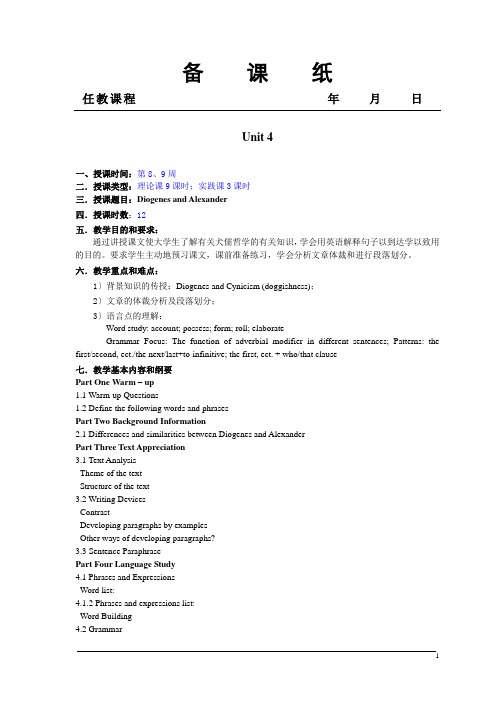
任教课程年月日Unit 4一、授课时间:第8、9周二.授课类型:理论课9课时;实践课3课时三.授课题目:Diogenes and Alexander四.授课时数:12五.教学目的和要求:通过讲授课文使大学生了解有关犬儒哲学的有关知识,学会用英语解释句子以到达学以致用的目的。
要求学生主动地预习课文,课前准备练习,学会分析文章体裁和进行段落划分。
六.教学重点和难点:1〕背景知识的传授:Diogenes and Cynicism (doggishness);2〕文章的体裁分析及段落划分;3〕语言点的理解:Word study: account; possess; form; roll; elaborateGrammar Focus: The function of adverbial modifier in different sentences; Patterns: the first/second, ect./the next/last+to-infinitive; the first, ect. + who/that clause七.教学基本内容和纲要Part One Warm – up1.1 Warm-up Questions1.2 Define the following words and phrasesPart Two Background Information2.1 Differences and similarities between Diogenes and AlexanderPart Three Text Appreciation3.1 Text AnalysisTheme of the textStructure of the text3.2 Writing DevicesContrastDeveloping paragraphs by examplesOther ways of developing paragraphs?3.3 Sentence ParaphrasePart Four Language Study4.1 Phrases and ExpressionsWord list:4.1.2 Phrases and expressions list:Word Building4.2 Grammar任教课程年月日ObjectPart Five Extension5.1 Group discussion八、教学方法和措施本单元将运用黑板、粉笔、多媒体网络辅助教学设备等教学手段,主要采用以学生为主体、教师为主导的任务型、合作型等教学模式,具体运用教师讲授法、师生讨论、生生讨论等方法进行教学。
DiogenesandAlexander翻译
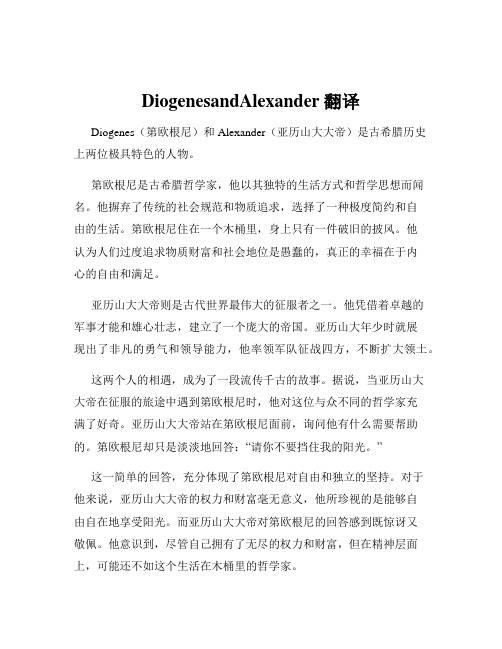
DiogenesandAlexander翻译Diogenes(第欧根尼)和 Alexander(亚历山大大帝)是古希腊历史上两位极具特色的人物。
第欧根尼是古希腊哲学家,他以其独特的生活方式和哲学思想而闻名。
他摒弃了传统的社会规范和物质追求,选择了一种极度简约和自由的生活。
第欧根尼住在一个木桶里,身上只有一件破旧的披风。
他认为人们过度追求物质财富和社会地位是愚蠢的,真正的幸福在于内心的自由和满足。
亚历山大大帝则是古代世界最伟大的征服者之一。
他凭借着卓越的军事才能和雄心壮志,建立了一个庞大的帝国。
亚历山大年少时就展现出了非凡的勇气和领导能力,他率领军队征战四方,不断扩大领土。
这两个人的相遇,成为了一段流传千古的故事。
据说,当亚历山大大帝在征服的旅途中遇到第欧根尼时,他对这位与众不同的哲学家充满了好奇。
亚历山大大帝站在第欧根尼面前,询问他有什么需要帮助的。
第欧根尼却只是淡淡地回答:“请你不要挡住我的阳光。
”这一简单的回答,充分体现了第欧根尼对自由和独立的坚持。
对于他来说,亚历山大大帝的权力和财富毫无意义,他所珍视的是能够自由自在地享受阳光。
而亚历山大大帝对第欧根尼的回答感到既惊讶又敬佩。
他意识到,尽管自己拥有了无尽的权力和财富,但在精神层面上,可能还不如这个生活在木桶里的哲学家。
第欧根尼的哲学思想对后世产生了深远的影响。
他的简约生活理念提醒着人们,不要被物质的欲望所迷惑,要追求内心的平静和真实的自我。
在当今社会,人们常常为了追求物质上的享受而忙碌奔波,忽略了内心的需求。
第欧根尼的故事让我们反思,是否我们所追求的东西真的能给我们带来幸福。
亚历山大大帝的征服之旅虽然充满了辉煌和成就,但也带来了战争的破坏和人民的苦难。
然而,从另一个角度来看,他的征服也促进了不同文化之间的交流与融合。
亚历山大大帝的帝国涵盖了众多不同的民族和文化,这种多元性在一定程度上推动了文明的发展。
第欧根尼和亚历山大大帝的对比,让我们看到了两种截然不同的价值观和生活方式。
大学英语(四)Diogenes_and_Alexander__戴奥吉尼斯和亚历山大
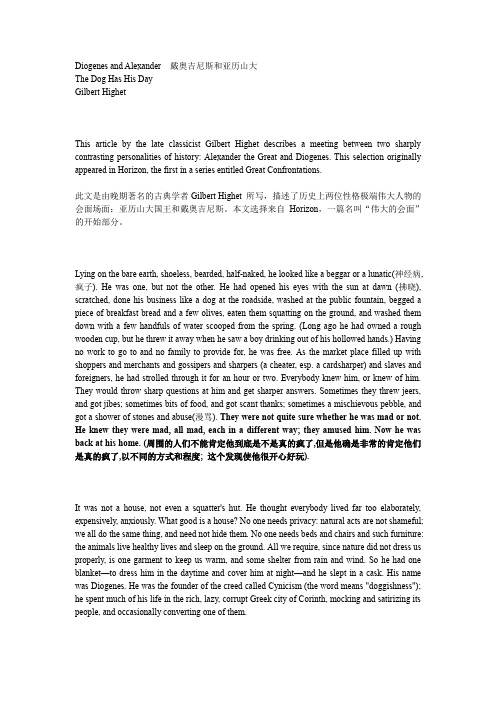
Diogenes and Alexander 戴奥吉尼斯和亚历山大The Dog Has His DayGilbert HighetThis article by the late classicist Gilbert Highet describes a meeting between two sharply contrasting personalities of history: Alexander the Great and Diogenes. This selection originally appeared in Horizon, the first in a series entitled Great Confrontations.此文是由晚期著名的古典学者Gilbert Highet 所写,描述了历史上两位性格极端伟大人物的会面场面:亚历山大国王和戴奥吉尼斯。
本文选择来自Horizon,一篇名叫“伟大的会面”的开始部分。
Lying on the bare earth, shoeless, bearded, half-naked, he looked like a beggar or a lunatic(神经病,疯子). He was one, but not the other. He had opened his eyes with the sun at dawn (拂晓), scratched, done his business like a dog at the roadside, washed at the public fountain, begged a piece of breakfast bread and a few olives, eaten them squatting on the ground, and washed them down with a few handfuls of water scooped from the spring. (Long ago he had owned a rough wooden cup, but he threw it away when he saw a boy drinking out of his hollowed hands.) Having no work to go to and no family to provide for, he was free. As the market place filled up with shoppers and merchants and gossipers and sharpers (a cheater, esp. a cardsharper) and slaves and foreigners, he had strolled through it for an hour or two. Everybody knew him, or knew of him. They would throw sharp questions at him and get sharper answers. Sometimes they threw jeers, and got jibes; sometimes bits of food, and got scant thanks; sometimes a mischievous pebble, and got a shower of stones and abuse(漫骂). They were not quite sure whether he was mad or not. He knew they were mad, all mad, each in a different way; they amused him. Now he was back at his home. (周围的人们不能肯定他到底是不是真的疯了,但是他确是非常的肯定他们是真的疯了,以不同的方式和程度; 这个发现使他很开心好玩).It was not a house, not even a squatter's hut. He thought everybody lived far too elaborately, expensively, anxiously. What good is a house? No one needs privacy: natural acts are not shameful; we all do the same thing, and need not hide them. No one needs beds and chairs and such furniture: the animals live healthy lives and sleep on the ground. All we require, since nature did not dress us properly, is one garment to keep us warm, and some shelter from rain and wind. So he had one blanket—to dress him in the daytime and cover him at night—and he slept in a cask. His name was Diogenes. He was the founder of the creed called Cynicism (the word means "doggishness"); he spent much of his life in the rich, lazy, corrupt Greek city of Corinth, mocking and satirizing its people, and occasionally converting one of them.His home was not a barrel made of wood: too expensive. It was a storage jar made of earthenware, something like a modern fuel tank—no doubt discarded because a break had made it useless. He was not the first to inhabit such a thing: the refugees driven into Athens by the Spartan invasion had been forced to sleep in casks. But he was the first who ever did so by choice, out of principle.Diogenes was not a degenerate or a maniac(疯子). He was a philosopher who wrote plays and poems and essays expounding(解释) his doctrine; he talked to those who cared to listen; he had pupils who admired him. But he taught chiefly by example. All should live naturally, he said, for what is natural is normal and cannot possibly be evil or shameful. Live without conventions, which are artificial and false; escape complexities and superfluities and extravagances: only so can you live a free life. The rich man believes he possesses his big house with its many rooms and its elaborate furniture, his pictures and expensive clothes, his horses and his servants and his bank accounts. He does not. He is their slave. In order to procure a quantity of false, perishable goods he has sold the only true, lasting good, his own independence. (富人们都相信, 拥有了属于自己的豪华大房子,房间很多,装饰和家具都很精致和气派, 还有很多的名画和很昂贵的衣服, 马匹和佣人,还有银行账户上的很多的钱。
Diogenes and Alexander 翻译

Diogenes and Alexander 翻译众所周知,古代希腊哲学家戴奥吉尼斯(Diogenes)和亚历山大大帝(Alexander the Great)之间的故事至今令人津津乐道。
这两位历史人物代表着两种截然不同的生活哲学和价值观。
本文将对双方进行比较,并探讨他们之间的冲突与共通之处。
戴奥吉尼斯是斯多亚学派的一位知名哲学家,他主张简朴和自由,追求真实的快乐和自足。
与之不同的是,亚历山大大帝则是一位伟大的军事统帅和征服者,他寻求权力和荣誉,追求辉煌的胜利。
据说,戴奥吉尼斯和亚历山大大帝在公元前4世纪曾有过一次非常有趣的碰面。
亚历山大大帝自称为世界君主,自诩为神的后裔。
他对自己的成就感到自豪,并迫切希望戴奥吉尼斯也承认他的卓越地位。
于是,在一次风和日丽的午后,亚历山大大帝找到了坐在街边的戴奥吉尼斯。
他向戴奥吉尼斯问好,并大声宣称:“戴奥吉尼斯,我是世界君主亚历山大!我拥有整个世界,我可以成为你的宝贝。
”然而,戴奥吉尼斯却毫不在意,慢悠悠地抬起头看着亚历山大大帝,然后轻描淡写地回答道:“抱歉,我现在正忙着看着我的专属太阳,你能稍后再来找我吗?”亚历山大大帝对戴奥吉尼斯的不屑一顾感到震惊,他无法理解这样一个平凡的人为何对他的伟大和荣耀如此漠不关心。
于是,亚历山大大帝压抑住内心的愤怒,耐心地问戴奥吉尼斯:“如果你不是忙于凝视太阳的话,你有什么要求吗?我可以满足你的愿望。
”戴奥吉尼斯幽默地回答道:“是的,如果你能站到一边,不挡住我的阳光,那我就满足了。
”这个寓言般的对话,精确地表达了戴奥吉尼斯的价值观。
他拒绝在亚历山大大帝面前低头,表达了对权力和军事胜利的淡薄态度。
相比之下,亚历山大大帝则展现了他的自尊心和对控制他人的渴望。
然而,尽管双方的价值观存在冲突,他们之间也有一些共通之处。
首先,二者都扮演了当时精神与行动的引领者的角色,无论是探索哲学真理还是征服世界,都在各自的领域内有着卓越的成就。
此外,戴奥吉尼斯和亚历山大大帝都是被后世仰慕的伟人,他们的故事激励着人们去思考和追寻更高的目标。
Unit_4_Diogenes_and_Alexander

e.g.
•
•
2. procure: obtain something, especially with effort or difficulty; acquire
•
> People all toil to get only those material things that are false and fleeting, but at the sacrifice of their own everlasting independence.
Main
idea of this part: Diogenes’ doctrine on house & the reason he chose to live in a cask.
Qs:
1. What are the key values he promotes? 2. What is his attitude toward wealth and power?
“Is there anything I can do for you?” --Diogenes: “Yes, stand to one side. You’re blocking the sunlight.”
Part Two Text Analysis
Plot of the story Setting of the story Protagonists of the story Theme of the story
11. He was not the first to inhabit such a thing. But he was the first who ever did so by choice, out of principle.(---3)
现代大学英语3-Unit-4-Diogenes-and-Alexander-词汇精讲
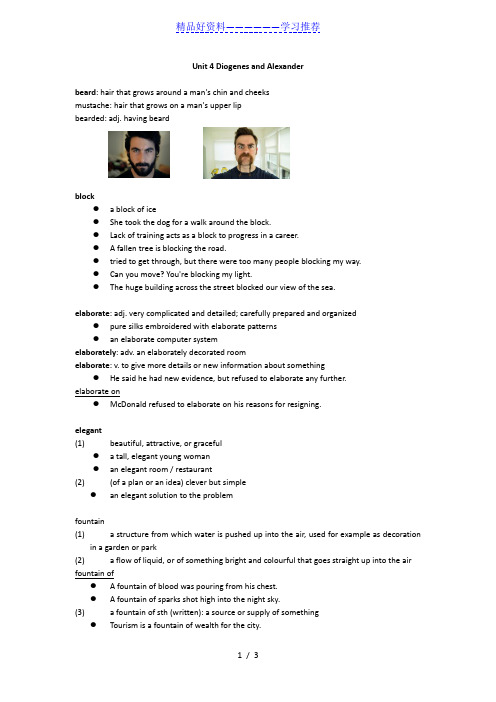
Unit 4 Diogenes and Alexanderbeard: hair that grows around a man's chin and cheeksmustache: hair that grows on a man's upper lipbearded: adj. having beardblock● a block of ice●She took the dog for a walk around the block.●Lack of training acts as a block to progress in a career.● A fallen tree is blocking the road.●tried to get through, but there were too many people blocking my way.●Can you move? You're blocking my light.●The huge building across the street blocked our view of the sea.elaborate: adj. very complicated and detailed; carefully prepared and organized●pure silks embroidered with elaborate patterns●an elaborate computer systemelaborately: adv. an elaborately decorated roomelaborate: v. to give more details or new information about something●He said he had new evidence, but refused to elaborate any further.elaborate on●McDonald refused to elaborate on his reasons for resigning.elegant(1)beautiful, attractive, or graceful● a tall, elegant young woman●an elegant room / restaurant(2)(of a plan or an idea) clever but simple●an elegant solution to the problemfountain(1) a structure from which water is pushed up into the air, used for example as decorationin a garden or park(2) a flow of liquid, or of something bright and colourful that goes straight up into the air fountain of● A fountain of blood was pouring from his chest.● A fountain of sparks shot high into the night sky.(3) a fountain of sth (written): a source or supply of something●Tourism is a fountain of wealth for the city.guffaw: to laugh loudlyother words to describe “laugh”half-nakedhalf-bloodedhalf-brother/sisterhalf-breedhalf-heartedlunatic: n. someone who behaves in a crazy or very stupid way; adj. extreme or dangerousmonarch: n. a king or queenmonarchy: the system in which a country is ruled by a king or queen; a country that is ruled by a king or queen●constitutional monarchy systemmonarchic/monarchical adj.●the old monarchical systemnudge(1)to push sb gently, especially with your elbow, in order to get their attention●H e nudged me and whispered, “Look who's just come in.”(2)to move forward slowly by pushing gentlynudge your way to/through etc (sth)●I started to nudge my way to the front of the crowd.oliveolive tree/groveolive oilolive greenolivebrancholive skin/complexionprivate n./adj.I need to speak to you in private.Saving Private Ryanprivate enterpriseprivate jokeprivate detective/eyeprivacy: n.scant: very little or not enoughscant regard: Peter had shown scant regard for her feelings.scant attention: Jen paid scant attention to their conversation.scoop/ladle/dipper/spoon (the Big Dipper)scratchHe was scratching at the bites on his arm.Don't worry; the cat won't scratch you.This crisis has politicians scratching their heads and wondering what to do.He had built the business up from scratch.squat v.(1)to sit with your knees bent under you and your bottom just off the ground, balancingon your feet●He squatted down beside the little girl.(2)to live in a building or on a piece of land without permission and without paying rent n.(1) a squatting position of the body(2) a building that people are living in without permission and without paying rent: to live in a squatsquatter n.stroll v./n. to walk somewhere in a slow relaxed way●She strolled over to join them.●Let's go for a stroll.Sweat v.(1)to have drops of salty liquid coming out through your skin because you are hot, ill,frightened, or doing exerciseI was sweating a lot despite the air-conditioning.Within minutes she was sweating profusely /heavily.He was sweating buckets (= a lot).(2)to work very hardThey sweated and saved for ten years to buy a house.I sweated blood to get that report finished.。
Diogenes and Alexander 翻译

Lesson 18 ——Diogenes and Alesander他躺在光溜溜的地上,赤着脚,胡子拉茬的,半裸着身子,模样活像个乞丐或疯子。
可他就是他,而不是别的什么人。
大清早,他随着初升的太阳睁开双眼,搔了搔痒,便像狗一样在路边解手。
他在公共喷泉边抹了把脸,向路人讨了一块面包和几颗橄榄,然后蹲在地上大嚼起来,又掬起几捧泉水送入肚中。
他没工作在身,也无家可归,是一个逍遥自在的人。
街市上熙熙攘攘,到处是顾客、商人、奴隶、异邦人,这时他也会在其中转悠一二个钟头。
人人都认识他,或者都听说过他。
他们会问他一些尖刻的问题,而他也尖刻地回答。
有时他们丢给他一些食物,他很有节制地道一声谢;有时他们恶作剧地扔给他卵石子,他破口大骂,毫不客气地回敬。
他们拿不准他是不是疯了。
他却认定他们疯了,只是他们的疯各有各的不同;他们令他感到好笑。
此刻他正走回家去。
他没有房子,甚至连一个茅庐都没有。
他认为人们为生活煞费苦心,过于讲究奢华。
房子有什么用处?人不需要隐私;自然的行为并不可耻;我们做着同样的事情,没什么必要把它们隐藏起来。
人实在不需要床榻和椅子等诸如此类的家具,动物睡在地上也过着健康的生活。
既然大自然没有给我们穿上适当的东西。
那我们惟一需要的是一件御寒的衣服,某种躲避风雨的遮蔽。
所以他拥有一张毯子——白天披在身,晚上盖在身上——他睡在一个桶里,他的名字叫狄奥根尼。
人们称他为“狗”,把他的哲学叫做“犬儒哲学”。
他一生大部分时光都在希腊的克林斯城邦度过,那是一个富裕、懒散、腐败的城市,他挖苦嘲讽那里的人们,偶尔也把矛头转向他们当中的某个人。
他的住所不是木材做成的,而是泥土做的贮物桶。
这是一个破桶,显然是人们弃之不用的。
住这样的地方他并不是第一个,但他确实是第一个自愿这么做的人,这出乎众人的想法。
狄奥根尼不是疯子,他是一个哲学家,通过戏剧、诗歌和散文的创作来阐述他的学说;他向那些愿意倾听的人传道;他拥有一批崇拜他的门徒。
卓顶精文2019-Unit-4-Diogenes-and-Alexander-教案讲义

Unit4一、授课时间:第8、9周二.授课类型:理论课9课时;实践课3课时三.授课题目:DiogenesandAlexander四.授课时数:12五.教学目的和要求:通过讲授课文使大学生了解有关犬儒哲学的有关知识,学会用英语解释句子以达到学以致用的目的。
要求学生主动地预习课文,课前准备练习,学会分析文章体裁和进行段落划分。
六.教学重点和难点:1)背景知识的传授:DiogenesandCynicism(doggishness);2)文章的体裁分析及段落划分;3)语言点的理解:Wordstudy:account;possess;form;roll;elaborateGrammarFocus:Thefunctionofadverbialmodifierindifferentsentences;Patterns:the first/second,ect./thenext/last+to-infinitive;thefirst,ect.+who/thatclause七.教学基本内容和纲要PartOneWarm–up1.1Warm-upQuestions1.2DefinethefollowingwordsandphrasesPartTwoBackgroundInformation2.1DifferencesandsimilaritiesbetweenDiogenesandAlexanderPartThreeTextAppreciation3.1TextAnalysis3.1.1Themeofthetext3.1.2Structureofthetext3.2WritingDevices3.2.1Contrast3.2.2Developingparagraphsbyexamples3.2.3Otherwaysofdevelopingparagraphs?3.3SentenceParaphrasePartFourLanguageStudy4.1PhrasesandExpressions4.1.1Wordlist:4.1.2Phrasesandexpressionslist:4.1.3WordBuilding4.2Grammar4.2.1ObjectPartFiveExtension5.1Groupdiscussion八、教学方法和措施本单元将运用黑板、粉笔、多媒体网络辅助教学设备等教学手段,主要采用以学生为主体、教师为主导的任务型、合作型等教学模式,具体运用教师讲授法、师生讨论、生生讨论等方法进行教学。
diogenes and alexander 文章赏析

diogenes and alexander 文章赏析一、介绍Diogenes和Alexander的背景及关系在古希腊历史中,Diogenes和Alexander两位人物极具代表性。
Diogenes,一位被誉为“智慧老人”的哲学家,他生活在公元前4th世纪,以崇尚自由、追求真理和智慧著称。
而Alexander,则是希腊帝国的奠基人,一位具有卓越军事才能和广泛影响力的统治者。
虽然他们生活在同一个时代,但两人的身份和追求有所不同,他们在一定程度上也反映了当时社会的矛盾和价值观的碰撞。
二、分析Diogenes作为智慧老人的象征及其对Alexander的影响Diogenes被誉为“智慧老人”,这不仅仅是因为他的年龄和智慧,更是因为他代表了当时一种追求自由、独立思考的精神。
他过着简朴的生活,倡导回归自然,反对束缚。
他的这种生活方式和思想观念对年轻的Alexander产生了深刻的影响。
在某种程度上,Alexander视Diogenes为自己的导师,从他那里寻求智慧和指导。
三、讨论Alexander对待Diogenes的态度及原因尽管Alexander是一位有着卓越才能的统治者,但他对待Diogenes的态度却十分尊敬。
这主要是因为Diogenes的智慧、品行和独立思考的精神深深地吸引了Alexander。
在他眼中,Diogenes是一个值得学习和景仰的典范。
此外,Alexander也认识到了Diogenes对他的统治和领导能力的启示,因此对他更加敬重。
四、分析Diogenes对Alexander的启示和影响Diogenes对Alexander的启示主要体现在三个方面:一是追求真理,这使Alexander在征战中始终保持着清醒的头脑,力求了解真实情况;二是崇尚自由,这使得Alexander在治理国家时,注重人民的自由和福祉;三是独立思考,这使得Alexander在面对困境时,能够作出明智的决策。
五、总结文章主题及启示本文通过对Diogenes和Alexander的描述,展示了两位截然不同的人物在某种程度上的共鸣。
Diogenes-and-Alexander-翻译
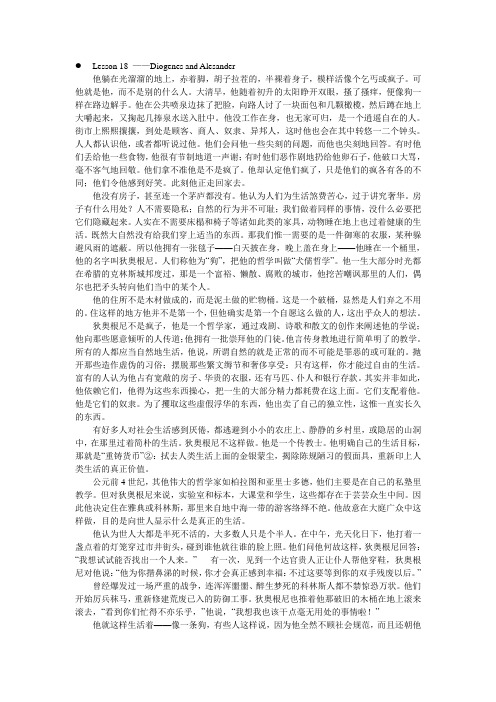
Lesson 18 ——Diogenes and Alesander他躺在光溜溜的地上,赤着脚,胡子拉茬的,半裸着身子,模样活像个乞丐或疯子。
可他就是他,而不是别的什么人。
大清早,他随着初升的太阳睁开双眼,搔了搔痒,便像狗一样在路边解手。
他在公共喷泉边抹了把脸,向路人讨了一块面包和几颗橄榄,然后蹲在地上大嚼起来,又掬起几捧泉水送入肚中。
他没工作在身,也无家可归,是一个逍遥自在的人。
街市上熙熙攘攘,到处是顾客、商人、奴隶、异邦人,这时他也会在其中转悠一二个钟头。
人人都认识他,或者都听说过他。
他们会问他一些尖刻的问题,而他也尖刻地回答。
有时他们丢给他一些食物,他很有节制地道一声谢;有时他们恶作剧地扔给他卵石子,他破口大骂,毫不客气地回敬。
他们拿不准他是不是疯了。
他却认定他们疯了,只是他们的疯各有各的不同;他们令他感到好笑。
此刻他正走回家去。
他没有房子,甚至连一个茅庐都没有。
他认为人们为生活煞费苦心,过于讲究奢华。
房子有什么用处?人不需要隐私;自然的行为并不可耻;我们做着同样的事情,没什么必要把它们隐藏起来。
人实在不需要床榻和椅子等诸如此类的家具,动物睡在地上也过着健康的生活。
既然大自然没有给我们穿上适当的东西。
那我们惟一需要的是一件御寒的衣服,某种躲避风雨的遮蔽。
所以他拥有一张毯子——白天披在身,晚上盖在身上——他睡在一个桶里,他的名字叫狄奥根尼。
人们称他为“狗”,把他的哲学叫做“犬儒哲学”。
他一生大部分时光都在希腊的克林斯城邦度过,那是一个富裕、懒散、腐败的城市,他挖苦嘲讽那里的人们,偶尔也把矛头转向他们当中的某个人。
他的住所不是木材做成的,而是泥土做的贮物桶。
这是一个破桶,显然是人们弃之不用的。
住这样的地方他并不是第一个,但他确实是第一个自愿这么做的人,这出乎众人的想法。
狄奥根尼不是疯子,他是一个哲学家,通过戏剧、诗歌和散文的创作来阐述他的学说;他向那些愿意倾听的人传道;他拥有一批崇拜他的门徒。
diogenes and alexander 文章赏析
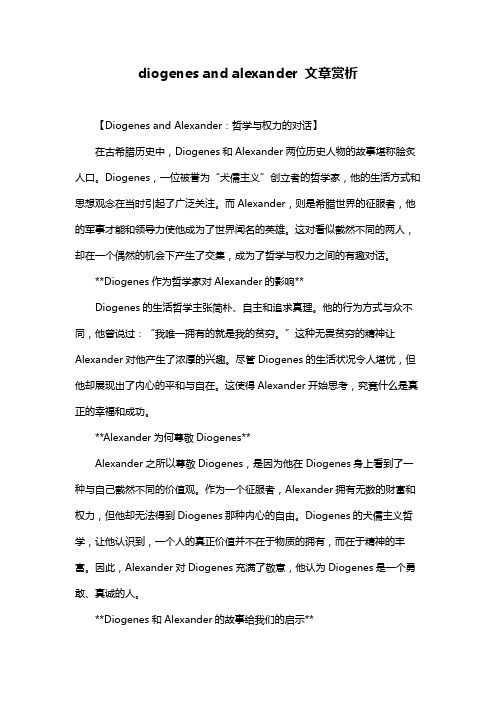
diogenes and alexander 文章赏析【Diogenes and Alexander:哲学与权力的对话】在古希腊历史中,Diogenes和Alexander两位历史人物的故事堪称脍炙人口。
Diogenes,一位被誉为“犬儒主义”创立者的哲学家,他的生活方式和思想观念在当时引起了广泛关注。
而Alexander,则是希腊世界的征服者,他的军事才能和领导力使他成为了世界闻名的英雄。
这对看似截然不同的两人,却在一个偶然的机会下产生了交集,成为了哲学与权力之间的有趣对话。
**Diogenes作为哲学家对Alexander的影响**Diogenes的生活哲学主张简朴、自主和追求真理。
他的行为方式与众不同,他曾说过:“我唯一拥有的就是我的贫穷。
”这种无畏贫穷的精神让Alexander对他产生了浓厚的兴趣。
尽管Diogenes的生活状况令人堪忧,但他却展现出了内心的平和与自在。
这使得Alexander开始思考,究竟什么是真正的幸福和成功。
**Alexander为何尊敬Diogenes**Alexander之所以尊敬Diogenes,是因为他在Diogenes身上看到了一种与自己截然不同的价值观。
作为一个征服者,Alexander拥有无数的财富和权力,但他却无法得到Diogenes那种内心的自由。
Diogenes的犬儒主义哲学,让他认识到,一个人的真正价值并不在于物质的拥有,而在于精神的丰富。
因此,Alexander对Diogenes充满了敬意,他认为Diogenes是一个勇敢、真诚的人。
**Diogenes和Alexander的故事给我们的启示**Diogenes与Alexander的故事,让我们思考了什么是真正的成功。
在现代社会,人们往往被物质诱惑所困扰,忽略了内心的追求。
而Diogenes的人生哲学,告诉我们,简朴、自主和追求真理的生活方式才是我们应该追求的。
同时,Alexander的尊敬Diogenes也提醒我们,无论身处何种地位,都应该保持谦逊,尊重他人的价值观。
diogenes and alexander 文章赏析

diogenes and alexander 文章赏析摘要:1.迪奥根尼斯与亚历山大故事的背景介绍2.迪奥根尼斯的人生哲学及其体现3.亚历山大与迪奥根尼斯的相遇及对话4.故事中所传达的人生哲理5.对现代人的启示正文:一、迪奥根尼斯与亚历山大故事的背景介绍迪奥根尼斯(Diogenes)是一位古希腊哲学家,他是犬儒学派(Cynic)的创立者,生活在公元前400年至公元前320年。
犬儒学派强调简朴、自制和自然的生活态度。
亚历山大(Alexander)则是古希腊的一位伟大征服者,他在公元前4世纪统一了希腊世界,并将其影响力扩展到亚洲和埃及等地。
二、迪奥根尼斯的人生哲学及其体现迪奥根尼斯主张人应当摆脱物质束缚,追求心灵的自由。
他认为,幸福并不取决于财富、地位等外在因素,而是取决于内心的智慧和觉悟。
为了体现这一观念,他选择过上简朴的生活,住在木桶里,穿着破烂的衣服,以乞讨为生。
他主张自给自足,不受世俗观念的约束,追求内心的自由与宁静。
三、亚历山大与迪奥根尼斯的相遇及对话有一次,亚历山大遇到迪奥根尼斯,他被迪奥根尼斯的生活态度所吸引,于是上前与他交谈。
亚历山大问迪奥根尼斯:“你有什么需要我帮助的吗?”迪奥根尼斯回答:“是的,请你让开,不要挡住我的阳光。
”这句回答令亚历山大深感敬佩,他认为迪奥根尼斯是一个勇敢、独立的人,尊敬地称他为“伟大的犬儒主义者”。
四、故事中所传达的人生哲理这个故事传达了以下人生哲理:1.内心自由比外在地位更重要;2.简朴生活有助于提升心灵的境界;3.勇敢面对困境,保持独立的人格;4.尊重他人,尤其是那些追求内心自由的人。
五、对现代人的启示迪奥根尼斯与亚历山大的故事给现代人带来以下启示:1.不要过分追求物质财富,重视心灵的成长;2.学会珍惜简单、平凡的生活;3.勇敢地追求自己的梦想,不受世俗观念的束缚;4.尊重他人的选择,包容不同的价值观。
通过这个故事,我们可以认识到,无论时代如何变迁,人生的本质需求并未改变。
10-Unit-4-Diogenes-and-Alexander-教案讲义

10-Unit-4-Diogenes-and-Alex ander-教案讲义任教课程年月日Unit 4一、授课时间:第8、9周二.授课类型:理论课9课时;实践课3课时三.授课题目:Diogenes and Alexander四.授课时数:12五.教学目的和要求:通过讲授课文使大学生了解有关犬儒哲学的有关知识,学会用英语解释句子以达到学以致用的目的。
要求学生主动地预习课文,课前准备练习,学会分析文章体裁和进行段落划分。
六.教学重点和难点:1)背景知识的传授:Diogenes and Cynicism (doggishness);2)文章的体裁分析及段落划分;3)语言点的理解:Word study: account; possess; form; roll; elaborateGrammar Focus: The function of adverbial modifier in different sentences; Patterns: the first/second, ect./the next/last+to-infinitive; the first, ect. + who/that clause七.教学基本内容和纲要任教课程年月日Part One Warm – up1.1 Warm-up Questions1.2 Define the following words and phrasesPart Two Background Information2.1 Differences and similarities between Diogenes and AlexanderPart Three Text Appreciation3.1 Text Analysis3.1.1 Theme of the text3.1.2 Structure of the text3.2 Writing Devices3.2.1 Contrast3.2.2 Developing paragraphs by examples3.2.3 Other ways of developing paragraphs?3.3 Sentence ParaphrasePart Four Language Study4.1 Phrases and Expressions4.1.1 Word list:4.1.2 Phrases and expressions list:4.1.3 Word Building任教课程年月日4.2 Grammar4.2.1 ObjectPart Five Extension5.1 Group discussion八、教学方法和措施本单元将运用黑板、粉笔、多媒体网络辅助教学设备等教学手段,主要采用以学生为主体、教师为主导的任务型、合作型等教学模式,具体运用教师讲授法、师生讨论、生生讨论等方法进行教学。
unit4 Diogenes and Alexander

Cynicism
--------cynicism
--------The development of Cynicism 安提西尼
---------The development of Cynicism 戴奥真尼斯
Alexander
-------information of Alexander -------influence of Alexander
Cynicism
cynicism,
in its original form, refers to the beliefs of an ancient school of Greek philosophers known as the Cynics. Their philosophy was that the purpose of life was to live a life of Virtue in agreement with Nature. This meant rejecting all conventional desires for wealth, power, health, and fame, and by living a simple life free from all possessions. As reasoning creatures, people could gain happiness by rigorous training and by living in a way which was natural for humans. They believed that the world belonged equally to everyone, and that suffering was caused by false judgments of what was valuable and by the worthless customs and conventions which surrounded society. Many of these thoughts were later absorbed into Stoicism斯多葛 哲学 .
Unit_4_Diogenes_and_Alexander
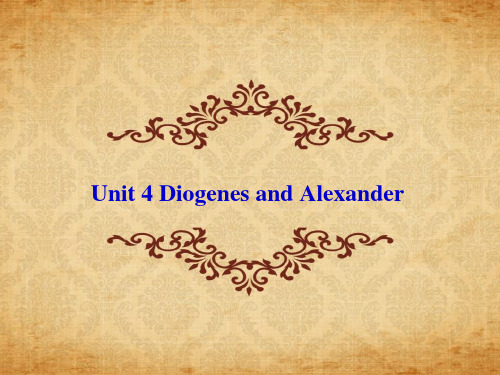
For understandable reasons, Diogenes has never had a large following. However, Diogenes has never been forgotten either, especially in modern times.
…….and washed them down with a few handfuls of water scooped from the spring. (para.1) A few handfuls of -ful here is used as a noun suffix. e.g. a few mouthfuls of / a spoonful of honey/a glassful of beer.
Unit 4 Diogenes and Alexander
Author: Gilbert Highet
Gilbert Highet (1906-1978) Scholarly and critical writers Born in Scotland and became American citizen Educated in Scotland and Oxford
II. Diogenes' meeting with Alexander(paras.11-17)
A. Alexander's presence in Corinth.(para.11) B. His motivation for visiting Diogenes.(paras.14-17) C. His brief exchange with Diogenes(paras.14-17)
Unit 4 Diogenes and Alexander

Text Analysis
Detailed Analysis
• 2. Sometimes they threw bits of food, and got scant thanks; sometimes a mischievous pebble, and got a shower of stones and abuse. (para. 1) • Paraphrase: • Sometimes people would throw bits of food to him, but he hardly thanked them at all. Sometimes they would throw a pebble at him for fun, but get a shower of stones and a stream of abuse in return. • a mischievous pebble: • transferred epithet 英语移就格
was followed by Crates of Thebes (克拉特斯).
It disappeared in the late 5th century although some have claimed that early Christianity adopted many of its ascetic and rhetorical ideas. 苦行僧和夸张的想法
2. What does the author tell us about Alexander? What did this king have in common with Diogenes, the beggar? Why was Alexander considered a man of destiny? 3. How would you contrast the two characters? What did Diogenes really mean when he said that Alexander was blocking the sunlight?
Diogenes and Alexander第奥真尼斯和亚历山大大帝(高教材料)

13
应用2
Aristotle , Alexander III
❖ 亚历山大大帝是亚里士多 德的弟子,他是一位智慧 非凡的人
❖ 亚历山大童年早期就显示 了在音乐和马术上的才华, 珍爱荷马诗歌,亚里士多 德给予他完整的口才和文 学训练,并且激发了他对 科学、医学和哲学的兴趣。
14
应用2
人物评论
❖ 亚历山大是历史上最富有戏剧性的人物,有关他生涯的确凿事
高“呼犬A“儒像 主狗 义一 ”样 (BC活y着n”ici。sCm人)们。把他他的们哲的学哲思学想叫为做
古希腊崇尚简朴的生活理想奠定了基础。
7
应用2
犬儒主义
❖ 犬儒主义是一种带着厌倦情绪的负面态度,对于他人行为 的动机与诚信都采取一种不信任的态度。
❖ 源于古希腊犬儒学派学者主张的哲学思潮。该派别由苏格
❖ 其主要教条是,人要摆脱世俗的利益而追求唯一值得拥有
的善.
Text in here
Text in here
❖ 倡导尽量少的改变自然,与自然和谐共处。不因人的过多 需求去改造自然,追求清静无为,小国寡民。
8
应用2
犬儒主义的发展
❖随着犬儒理念的流行,犬儒主义的内涵发生了微 妙的根本变化。早期的犬儒主义者是根据自身的 道德原则去蔑视世俗的观念;后期的犬儒主义者 依旧蔑视世俗的观念,但是却丧失了赖为准绳的 道德原则
Alexander III
❖ 亚历山大大帝(公元前 356-前323年),古 代马其顿国王,亚历山 大帝国皇帝,世界古代 史上著名的军事家和政 治家。
❖ 古代马其顿国王腓力二 世之子。
❖ 亚里士多德的学生之一。
11
应用2
亚历山大大帝
20岁继承王位 13岁随父出征
- 1、下载文档前请自行甄别文档内容的完整性,平台不提供额外的编辑、内容补充、找答案等附加服务。
- 2、"仅部分预览"的文档,不可在线预览部分如存在完整性等问题,可反馈申请退款(可完整预览的文档不适用该条件!)。
- 3、如文档侵犯您的权益,请联系客服反馈,我们会尽快为您处理(人工客服工作时间:9:00-18:30)。
Glossarybearded•有胡须的• a bearded 40-year old professor •beard 胡须n,公然反对,抓某人胡须v.•laugh at one's beard•当面嘲笑•laugh in one's beard•玩弄某人后暗自好笑•beard the lion in his den.•太岁头上动土•meet/run/be in one's beard•公然反对,使为难•speak in one's beard•喃喃的说block•v.阻止,阻塞•The police have blocked the road.•警察已经封锁了道路。
•My nose is all blocked up and I can hardly breathe.•我鼻子塞了,气都透不过来。
•a row of tree block his view•n. 街区,建筑,大块•a bolck of ice,wood•a white painted apartment block be sent to the block上断头台,拍卖•vi.•block in 堵塞封闭•block off 封锁•block out 遮住cynicism•n.犬儒主义•n.愤世嫉俗•I found ben's cynicism annoying at times.•我觉得本的愤世嫉俗论有时让人烦。
•His words were tinged with cynicism.•他的话里透着嘲讽意味。
•同根词•cynic 犬儒主义者,愤世嫉俗的人•cynical 愤世嫉俗的,犬儒主义的elaborately•adv. 刻苦地,费心地,详尽地•adj. elaborate•an ~ plan , an ~ 5-courses meal•n. elaboration•v. elaborate 费心制作,详细阐述•You understand the situation,so I needn't elaborate any further on/upon it.•你了解形势, 我无须赘述.elegant•优雅的,大方的, 讲究的• 1.If you describe a person or thing as elegant, you mean that they are pleasing and graceful in appearance orstyle.•an elegant restaurant,•an ~ woman• 2.If you describe a piece of writing, an idea, or a plan as elegant, you mean that it is simple, clear, and clever. •The document impressed me with its elegant simplicity.fountain•喷泉,源泉•fountain pen•钢笔•drinking fountain•饮水机•The brain is the ultimate fountain of ideas.•大脑是思想的根本源泉。
guffaw•n. 哄笑大笑•he bursts into a loud guffaw.•他突然大笑起来。
•let out a loud guffaw.•v. 哄笑,大笑•As they guffawed loudly, the boss arrived.•正当他们哈哈大笑时,老板来了。
half-naked •半裸的lunatic• 1. n.疯子sb ,you think they behave in a dangerous, stupid, or annoying way•Her son thinks she's an absolute raving lunatic.•她的儿子认为她是个十足的满口胡言的疯子。
• 2. adj. 疯狂的+idea ,behavior•to steal the moon is absolutely a ~ idea.• 3. adj. 疯狂的+place=out of control•He pleads for sanity in a lunatic world.macedonian马其顿人6世纪末~7世纪初,斯拉夫部落沿用了公元前5~前2世纪存在于该地区的古代马其顿国的名称。
7世纪末~9世纪中期,拜占庭入侵,1389年马其顿大部被土耳其占领。
1912~1913年巴尔干战争后,马其顿摆脱土耳其统治。
1941年10月马其顿人民参加反法西斯武装解放斗争,1945年11月成为南斯拉夫联邦共同体的一员。
1991年11月20日马其顿宣布独立。
马其顿人的传统经济以种植玉米、小麦、烟草、棉花为主,养羊业发达,工业以冶金、纺织、烟草加工为主。
monarch•君主•monarchal 君主的•monarchy 君主政体nudge•v.轻推•I nudged Stan and pointed again.•我轻推了推斯坦,又指了一下。
•v. 好言说服•Bit by bit Bob had nudged Fritz into selling his controlling interest.•鲍勃一点一点地说服弗里茨卖掉自己的控股权。
olive•n 橄榄•adj 橄榄色的page•n。
页a page of history•男侍者page boy•v. 叫喊•He was paged repeatedly as the flight was boarding.•登机时,他被反复地呼叫着。
paradox•自相矛盾的说法,似是而非的论点•Death itself is a paradox, the end yet the beginning.•死亡本身就是自相矛盾的,既是终结也是开始。
“所有克利特人都说谎,他们中间的一个诗人这么说。
”在萨维尔村,理发师挂出一块招牌:“我只给村里所有那些不给自己理发的人理发。
”有人问他:“你给不给自己理发?”理发师顿时无言以对。
世界上没有绝对的真理”pebble •卵石scant•adj 少量的,不足的,忽视的•pay scant attention to sb's advice•不甚重视某人的劝告•with scant regard for my feelings•不大理会我的感情.•v.限制,忽视•scant the scale•This important factor was scanted by most of us.•这一重要因素被我们大多数人所忽视。
scoop•v.用勺子舀,抢先报道•scoop a hole in the sand 用铲子在沙子上挖洞.•She scooped all the national newspapers to get the story. 她抢在全国各报之前发表了这一消息.•He scooped the coins up/out in his hands. 他用手把硬币捧了起来.•n.独家新闻,勺子scratch• 1.v.抓蹭• 2.(常与out, off, through连用)刮掉,削去;擦去,删掉,划掉•to scratch the paint off the wall•从墙上刮下油漆•scratch the surface•不深刻;不周详•from scratch•从零做起;白手起家•without a scratch•安然无恙;完好无损squatter •蹲着的人•squat v.蹲下(~down)•We squatted beside thepool and watched thediver sink slowly down.•我们蹲在池边,看潜水员慢慢沉下水•adj.矮胖的•Eddie was a short squatfellow in his forties withthinning hair.•埃迪是个矮胖的人,四十来岁,头发稀疏。
stroll•v. 漫步闲逛•He collected some orange juice from the refrigerator and, strolled to the kitchen window.•他从冰箱里取了些橙汁,溜达到厨房的窗边。
•n. take a stroll 漫步溜达sweat•v.出汗,辛苦工作•I sweated all night on the desk.•我伏案工作了一宿。
•to sweat for one's family•为养家胡口拼命工作•n.汗水•in a cold sweat 出冷汗•The very thought brought me out in a cold sweat.•这个念头让我出了一身冷汗。
titter•v. n. 窃笑偷笑•同义词:snigger •snicker•laugh in one's beard•。
